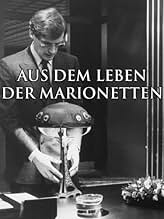NOTE IMDb
7,2/10
5 k
MA NOTE
Ajouter une intrigue dans votre langueAn account of the events before and after a murder committed by a disturbed businessman in a strained marriage, and what led him to perform such a shocking act.An account of the events before and after a murder committed by a disturbed businessman in a strained marriage, and what led him to perform such a shocking act.An account of the events before and after a murder committed by a disturbed businessman in a strained marriage, and what led him to perform such a shocking act.
- Réalisation
- Scénario
- Casting principal
- Récompenses
- 1 victoire au total
Paul Bürks
- The Assistant in the fashion show
- (non crédité)
Avis à la une
Bergman's working with a very restricted palette here, as he did with The Rite or Winter Light. The romantic, funny touches you expect from him are missing. Peter's mind is crumbling; he's a modern Othello obsessed with his wife's fidelity amid the tasteful furniture of their elegant home. All the action is seen through the distorting lens of Peter's madness. Why would his wife say, in front of strangers, that she has to get drunk to steady her nerves at her mother-in-law's place? This is the disturbed mind at work.
The acting is fine. Robert Atzorn and Walter Schmidinger do very well as, essentially, two sides of the same coin (the stodgy businessman and the gay fashion designer). Christina Buchegger is wonderful as Katharina, the wife; her attempts to win out over Peter's psychosis give the film what drama it has.
The acting is fine. Robert Atzorn and Walter Schmidinger do very well as, essentially, two sides of the same coin (the stodgy businessman and the gay fashion designer). Christina Buchegger is wonderful as Katharina, the wife; her attempts to win out over Peter's psychosis give the film what drama it has.
A short comment - enjoyed this and it is up to the usual Bergmann standards. As with many of his other films sticking with some of the difficult opening scenes rewards the viewer later with a thought provoking account of one man's depression leading to violence and murder. In many ways Bergman is the jacques costeau of the film world, exploring the deep seas and bringing up to the surface what lies below!
Pros:
1. The movie begins with an eye-catching opening which is simultaneously tense, suspenseful, and unflinchingly brutal. It also serves as an intriguing view into the main character.
2. The flashbacks are presented with a black-and-white colour palette, which is just a nice and simple way of delineating them from the present.
3. Both Robert Atzorn (Peter Egermann) and Christine Buchegger (Katarina Egermann) deliver fantastic performances.
4. The film serves as a fascinating insight into the mind of a psychopath who also happens to be suffering from marriage and sex issues.
5. The cinematography, especially in regards to the framing of the shots, is sharp and concise.
Cons: 1. The sound design is a little off at times. 2. The continuous sex, and sex-related content, starts to get a little repetitive. 3. The movie, at times, feels too pretentious which pulls the viewer out of the immersion.
Cons: 1. The sound design is a little off at times. 2. The continuous sex, and sex-related content, starts to get a little repetitive. 3. The movie, at times, feels too pretentious which pulls the viewer out of the immersion.
Despite having seen the best part of Höstsonaten, Bergman's film immediately prior to Aus dem Leben der Marionetten, I never completed the viewing experience. Thus, this ranks itself as my very first Bergman, something I'd been rather looking forward to for quite some time.
Beginning with a surprising scene in which a well dressed man strangles a prostitute, Aus dem Leben der Marionetten follows this event up by examining the events before and after it, hopping through a time frame of two to three months. Through the conversations which precede and follow this catastrophe—as the film's intertitles elect to label it—we learn gradually more about the reasons and the people behind it.
I have a very deep proclivity toward non-English films playing late at night on television, particularly those in German—simply because I'm a student thereof. In the fleeting moments between realising such a film directed by the acclaimed Bergman—of whom I regrettably knew rather little—was about to grace my screen and its beginning, I was somewhat disenchanted to learn that this is not considered amongst his greatest. Nevertheless, I happily sat back to watch the potential magic unfold. The opening scene of murder is a strange one, the severity of the violence neither understood by its recipient or indeed by us; verily, it is suggested that not even the assailant understands what he is doing. Thereafter, an intriguing thing happens: the colour drains from the film, turning the previous rich reds to a dull monochrome. This effect is fascinating, inviting us to ruminate upon its purpose more than beginning in black and white would have done. The film follows this up with a non-chronological narrative progression, ducking from past to future—considering the murder the present, of course. Most of these scenes take the form of intimate conversations or extended monological musings, discussing in a vague manner many aspects of life. These are beautifully shot, a scene in which a homosexual man addressing the killer's wife slowly comes to regard himself in the mirror completely entrancing and surprisingly tender. Noteworthy too are the dream sequences—most rife in the film's middle section—dazzlingly bright and beautifully narrated. These exhibit a visual flair as inherently important to an understanding of the film as any dialogue. The film is both visually and thematically interesting, examining through both the factors that drive ordinary people to brutal actions. Somewhat of a recondite piece, it is the kind of film that lingers with you, returning to your mind a number of times after viewing. The performances, particularly that of Martin Benrath—in the role of the aforementioned gentleman—are nothing short of arresting.
Containing a cornucopia of pleasing visuals and highly effective metaphors—the importance of mirrors springs to mind—Aus dem Leben der Marionetten is a voluptuous treatise on life and love; repression and expression; individuality and relationships. Slow moving, but completely involving, if this is a lesser Bergman, I can't wait to see how he could improve upon it.
Beginning with a surprising scene in which a well dressed man strangles a prostitute, Aus dem Leben der Marionetten follows this event up by examining the events before and after it, hopping through a time frame of two to three months. Through the conversations which precede and follow this catastrophe—as the film's intertitles elect to label it—we learn gradually more about the reasons and the people behind it.
I have a very deep proclivity toward non-English films playing late at night on television, particularly those in German—simply because I'm a student thereof. In the fleeting moments between realising such a film directed by the acclaimed Bergman—of whom I regrettably knew rather little—was about to grace my screen and its beginning, I was somewhat disenchanted to learn that this is not considered amongst his greatest. Nevertheless, I happily sat back to watch the potential magic unfold. The opening scene of murder is a strange one, the severity of the violence neither understood by its recipient or indeed by us; verily, it is suggested that not even the assailant understands what he is doing. Thereafter, an intriguing thing happens: the colour drains from the film, turning the previous rich reds to a dull monochrome. This effect is fascinating, inviting us to ruminate upon its purpose more than beginning in black and white would have done. The film follows this up with a non-chronological narrative progression, ducking from past to future—considering the murder the present, of course. Most of these scenes take the form of intimate conversations or extended monological musings, discussing in a vague manner many aspects of life. These are beautifully shot, a scene in which a homosexual man addressing the killer's wife slowly comes to regard himself in the mirror completely entrancing and surprisingly tender. Noteworthy too are the dream sequences—most rife in the film's middle section—dazzlingly bright and beautifully narrated. These exhibit a visual flair as inherently important to an understanding of the film as any dialogue. The film is both visually and thematically interesting, examining through both the factors that drive ordinary people to brutal actions. Somewhat of a recondite piece, it is the kind of film that lingers with you, returning to your mind a number of times after viewing. The performances, particularly that of Martin Benrath—in the role of the aforementioned gentleman—are nothing short of arresting.
Containing a cornucopia of pleasing visuals and highly effective metaphors—the importance of mirrors springs to mind—Aus dem Leben der Marionetten is a voluptuous treatise on life and love; repression and expression; individuality and relationships. Slow moving, but completely involving, if this is a lesser Bergman, I can't wait to see how he could improve upon it.
Perhaps I'm biased as I am a great admirer of Ingmar Bergman, but I found myself both fascinated and impressed by From the Life of the Marionettes. Excepting All These Women, the only film(of those I've seen, which is a little over two-thirds) that I didn't care for, Bergman's films have ranged to solid to outstanding. From the Life of the Marionettes is not one his very finest, but it is one of the films of his that is close to outstanding. Apart from the I agree underdeveloped homosexual subplot, there is very little of the film to criticise. The production values could be seen as stark, but still sublime and even haunting and shot beautifully. Bergman directs superbly with his usual control and discipline, while the speeches are thoughtful and the structure consisting of drama, documentary, character study, flashback and dream sequences is constantly attention-grabbing and I didn't find myself confused by it. The characters could be seen as cold, but purposefully and there is the trademark compelling realism of Bergman's films here. There aren't Sweden's finest ever actors on board, but the acting is still very good. All in all, very undervalued Bergman with lots of interest value. 9/10 Bethany Cox
Le saviez-vous
- AnecdotesDe la vie des marionnettes (1980) is Director Ingmar Bergman's only movie shot in the German language. L'Œuf du serpent (1977) was shot in Germany, too, but mostly in English.
- ConnexionsFeatured in Drugoe Kino: From the Life of the Marionettes (2006)
- Bandes originalesTouch Me, Take Me
Performed by Rita Wright
Meilleurs choix
Connectez-vous pour évaluer et suivre la liste de favoris afin de recevoir des recommandations personnalisées
Détails
- Date de sortie
- Pays d’origine
- Langue
- Aussi connu sous le nom de
- From the Life of the Marionettes
- Lieux de tournage
- Sociétés de production
- Voir plus de crédits d'entreprise sur IMDbPro
Box-office
- Montant brut mondial
- 4 293 $US
- Durée
- 1h 44min(104 min)
- Couleur
- Mixage
Contribuer à cette page
Suggérer une modification ou ajouter du contenu manquant

















